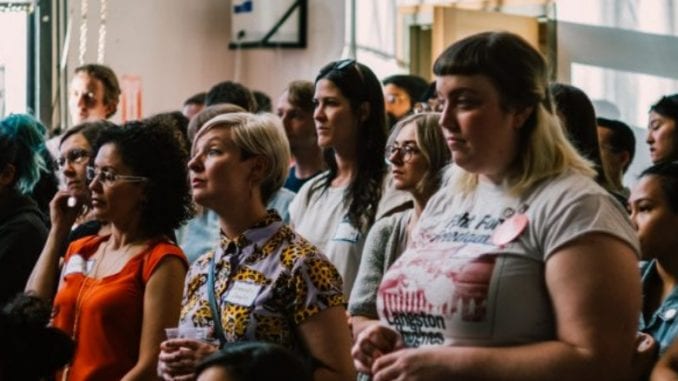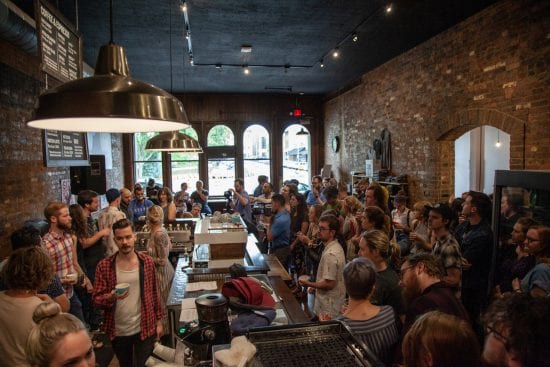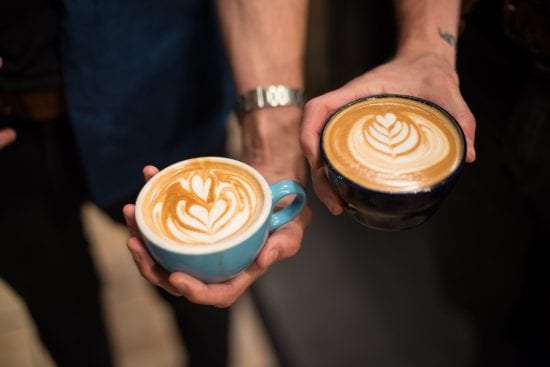
Whether you’re planning a latte art throwdown or a huge event, we tell you everything you need to know before you ask a company to be a sponsor.
BY ASHLEY RODRIGUEZ
BARISTA MAGAZINE ONLINE
Photo by Christopher Strum
As you start to plan your next latte art throwdown, perhaps you’re wondering who will provide the prizes. Or maybe you’re looking at beverage options for the next The Coffeewoman event (like the one pictured above). Most events require resources to be successful, and this is where sponsors come in: They can provide the monetary resources to help make your event amazing.
However, asking a company or person for money can be terrifying, and it’s hard to know where to start. I talked to Nathanael May, customer marketing manager at Pacific Foods—a sponsor of events like the World Barista Championship and the Glitter Cat Barista Bootcamp, and the recipient of a lot of sponsorship pitches—about the things you should consider when asking for support for your event.
1. Always ask, even if you think they’ll say no.
Asking for sponsorship can sometimes be a long shot, but you never know who will say yes, and the worst that can happen is someone says no. “And regularly, they’ll say yes!” Nathanael says. “Even if we can’t support an event or a person with a lot of money, we’ll always try to do something. Think about it this way: We can’t say yes to something we never hear about—asking is giving someone the opportunity to say yes.”

2. Have the numbers and figures in your head.
You should have some idea of how much money or resources you need—even if that number changes, having a firm number shows that you’ve thought about this and have a plan.
“And even better than having them in your head, write them down, and itemize the list! It’s totally realistic to need hundreds or thousands of dollars to produce something, but just asking for a blanket amount without itemization makes it challenging for the sponsor to understand what their money is going toward,” Nathanael says.
“Itemization also shows forethought—I can tell you’re taking this seriously. It also gives us the opportunity to say yes somehow. Remember how we always want to do something? Well, we may not be able to give you $6,000 for your whole event, but maybe we can cover the $1,200 event space rental. Your planning helps us partner with you more effectively.”
3. Be conscious of who you ask.
As Nathanael mentioned, companies want to help if they can, but part of being a sponsor means getting the company’s name out there. Be mindful of who you ask and that companies that offer similar services or products might not want to sponsor the same event.
“This is huge—going to both Coffee Parts and Coffee Supply for sponsorship for one event may seem like covering your bases, but what happens if they both say yes? What do you put on your poster? Who gets preferential treatment? Sponsors want to be supportive of the community, but they’re also promoting their businesses,” says Nathanael.

4. Explain why you’re the person for this job.
Not everyone is as plugged into the coffee community as you are (at least plugged in enough to be reading an article about asking for sponsorship)! Some potential sponsors might need to know how this event benefits them and why you’re the person to throw a successful event. “This is helpful because not everyone at every company is engaged deeply in the coffee industry—in fact, most people at most companies aren’t, statistically speaking,” Nathanael says.
He continues, “So even though you’re a successful staple in the regional throwdown scene, someone at Company Y might not know that you’re the ideal candidate to run the event that you’re planning when the trade show comes to town in two months (you’re planning that far in advance at least, right?). Don’t be afraid to have a bio ready that shows your qualifications for receiving money/product/swag from companies!”
5. Ask for help!
If you don’t know who to ask or how much money to pitch, please reach out to others. Likely, someone has thrown an event similar to yours, and can give you tips on who wants to support your event and how much is a reasonable amount. “Ask other people what a realistic and reasonable amount of money is when requesting financial sponsorship,” Nathanael says.
He also says that it’s easy to get sticker-shocked, so asking for help can make you more comfortable when pitching a large sum of money. “$500 may seem like a ton of money, but in sponsorship terms, it isn’t, and it won’t go very far to make an event amazing. If you need $2,500, please ask for $2,500. A sponsor is better served by their association with a great event than one that didn’t budget appropriately, and didn’t ask for what they actually needed.”
Want more information on hosting your own coffee event, specifically a throwdown? Justin Shepherd, organizer of My Old Kentucky Throwdown, has an article on the subject in the current issue of Barista Magazine!

